

OPM - Online Program Mgmt. Makerspace. STEAM. UAS-Drone Education. Self-Directed Learning. Online Student Support. Competency Based Education - CBE. 3D for ED. 2018 Horiz. Report. Four Stats That Will Impact Higher Ed in 2017. The Learner Revolution & Higher ED. With your existing account from... {* loginWidget *} With a traditional account... {* #signInForm *} {* signInEmailAddress *} {* currentPassword *} Create Account {* poweredByJanrain *} {* /signInForm *} {* #emailNewsletterEnrollmentForm *} {* signInEmailAddress *} Newsletters {* optInDailyNewsUpdate *} News, opinion and jobs in higher education - delivered each weekday. {* optInWeeklyNewsUpdate *} Your need-to-know digest of the week's news - delievered Friday morning.
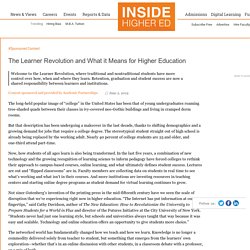
Specialized Newsletters {* optInAdmissionsUpdate *} A weekly look at the latest news, opinion and careers related to admissions and enrollment, sent each Monday. {* optInDiversityMatters *} Weekly update with news, essays and career advice about diversity in higher ed, sent each Tuesday. {* optInInsideDigitalLearning *} Weekly, in-depth coverage of technology and the learning experience, sent each Wednesday. {* optInCareersUpdate *}
How to Answer the Value Question: Five EdTech Vendors to Watch - Welcome to Encoura. In higher eduation, the answer to the “value question” remains elusive.
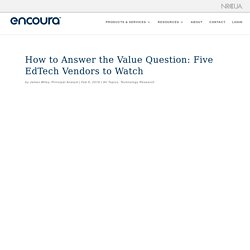
Despite their efforts, many colleges and universities struggle to demonstrate the value they provide to students, families, and society. Some of these efforts have arisen out of the need to satisfy accreditation, meet accountability demands, or improve institutional performance. Complicating them, however, is a persistent lack of clarity around what “value” really means in higher education.
It is about completion, student achievement, career advancement, or addressing income inequality? Or is demonstrating value more about focusing on inputs like competencies, faculty activity, course evaluation, or graduation rates? As a result, many institutions have turned to technology solutions, not because they see them as a silver bullet, but in the hope that these solutions will help.
Today’s Wake-Up Call is dedicated to helping institutions sort through the marketplace for these solutions. Establishing a Framework eLumen. Arizona embarks on plan to develop 25 global microcampuses. Rather than build its own brick-and-mortar branch campuses, the University of Arizona is embarking on a plan to open more than 25 “microcampuses” at international partner universities over the next three years, creating a network that it hopes will be capable of educating more than 25,000 students around the globe.
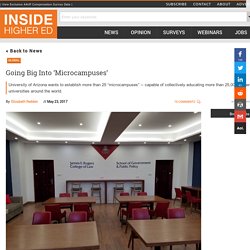
Arizona’s plan is for each of the microcampuses to offer at least one, and in most cases several, dual-degree programs in which degrees are conferred by both Arizona and a partner university. Each microcampus will be housed at the partner university, which agrees to provide classrooms and a UA-branded space. 4 out of 5 Companies Have Hired a Coding Bootcamp Graduate. Computer Science 4 out of 5 Companies Have Hired a Coding Bootcamp Graduate With tech skills in high-demand, coding bootcamps are doing pretty well, with Course Report estimating 18,000 graduates by the end of this year.
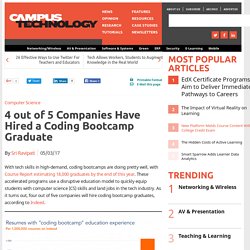
These accelerated programs use a disruptive education model to quickly equip students with computer science (CS) skills and land jobs in the tech industry. As it turns out, four out of five companies will hire coding bootcamp graduates, according to Indeed. The job search platform recently surveyed more than 1,000 HR managers and technical recruiters at companies of all sizes in the United States, a blog post explained. Overall, perceptions of coding bootcamp graduates are mostly positive. More importantly, bootcamp graduates are held in high esteem, with 72 percent of employers answering that bootcamp grads are “just as prepared and likely” to be top-performers as candidates with computer science degrees.
About the Author. On-Campus Enrollment Shrinks While Online Continues its Ascent. Research.
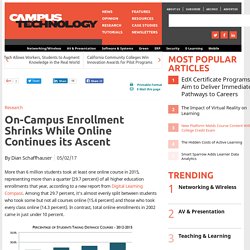
Why do we need the Democratization of Machine Learning? We are living in an era of hype.

In this article, I am trying to discover the hype around Artificial Intelligence. The First thing I want to clear is that ML/DL are algorithms, neither conscious nor intelligent or smart machines. There’s more to Artificial General Intelligence than just Machine Learning or Deep Learning. I agree that Deep Learning has penetrated industries and it holds the potential to disrupt industries, but it is nowhere near to being conscious or an intelligent machines. The term Masses is so powerful that once aligned together, it brings revolutions. Singularity, AI taking over the world, End of the world were one of the most used phrases in the media last year. If you talk to the researchers or the experts, their views on this are poles apart.
AI is a pie and everyone wants to have a bite of it. AI/ML tools are limited to the researchers, industry, colleges and labs. A warning from Bill Gates, Elon Musk, and Stephen Hawking. “The automation of factories has already decimated jobs in traditional manufacturing, and the rise of artificial intelligence is likely to extend this job destruction deep into the middle classes, with only the most caring, creative or supervisory roles remaining.” — Stephen Hawking There’s a rising chorus of concern about how quickly robots are taking away human jobs.

Here’s Elon Musk on Thursday at the the World Government Summit in Dubai: Educause Announces Top IT Issues, Trends and Tech Report for 2017. IT Trends Educause Announces Top IT Issues, Trends and Tech Report for 2017 By Dian Schaffhauser01/18/17 Expanding on the preview of its annual ranking of IT issues for higher education released last fall, Educause today announced its full report on the key issues, trends and technologies poised to impact higher ed in 2017.
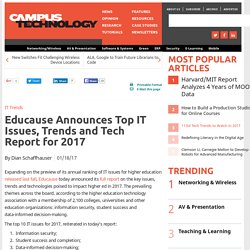
The prevailing themes across the board, according to the higher education technology association with a membership of 2,100 colleges, universities and other education organizations: information security, student success and data-informed decision-making. The top 10 IT issues for 2017, reiterated in today's report: 11 Ed Tech Trends to Watch in 2017. Virtual Roundtable 11 Ed Tech Trends to Watch in 2017.
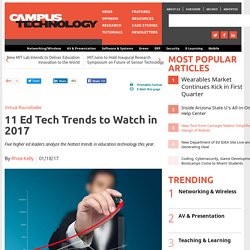
Eleven Reasons To Be Excited About The Future of Technology – Medium. “The strongest force propelling human progress has been the swift advance and wide diffusion of technology.” — The Economist In the year 1820, a person could expect to live less than 35 years, 94% of the global population lived in extreme poverty, and less that 20% of the population was literate.
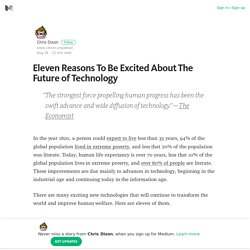
Today, human life expectancy is over 70 years, less that 10% of the global population lives in extreme poverty, and over 80% of people are literate. These improvements are due mainly to advances in technology, beginning in the industrial age and continuing today in the information age. There are many exciting new technologies that will continue to transform the world and improve human welfare. Pearson to Add Watson Smarts to Online Courseware. Artificial Intelligence. The 40 Best Places to Learn Something New Every Day. Learn something new and get smarter with these awesome sites and courses.
A few decades ago, when you wanted to learn something new, it meant spending a couple of evenings a week at a local school, maybe taking a photography or bookkeeping class from a bored night school instructor. Today, the worlds of learning and personal or professional development are literally at your fingertips. The open learning movement has made the opportunity to get smarter in your spare time completely accessible to anyone with an internet connection, and it’s exploded in recent years. Stackable Credentials. By Howard Lurie & Karen Svarczkopf@evhowardlurie | @karensvarczkopf SXSW turns 30 years young this year.
What started out as a small, Austin-weird music festival has grown into a mainstream cultural force that celebrates film, interactive software, the environment, and—our personal favorite—edtech innovation at SXSWedu. In honor of this milestone, we thought we’d pay homage to SXSW’s musical roots with a playlist to showcase some of the themes we heard around Austin last week and those we wish we had heard more of. Half of Online Students Would Not Opt for Live Courses. Research Half of Online Students Would Not Opt for Live Courses New research into the demographics of online college students found 50 percent of them would probably not choose to attend classes on a physical campus. Half of higher education students taking advantage of online instruction said in a survey they either would not or were not sure they would attend live courses even if they were available to them.
That's according to the fifth annual survey by Learning House and Aslanian Market Research on the demographics of students who are pursuing online college degrees. A Million Students Push for Postsecondary Data Reform. Policy A Million Students Push for Postsecondary Data Reform Young Invincibles, a nonprofit research and advocacy organization that works to resolve issues facing young adults, has published a new education agenda that is currently supported by more than a million students. The “Student Agenda for Postsecondary Reform” focuses on improving the quality of federal data that tracks how well students perform at colleges and universities. Young Invincibles created the agenda with input from workshops, listening sessions and roundtable conversations held over the last two years. Ultimately, the agenda is a call to action to “improve how the United States collects and uses data” in the higher education system, so that students can see salary, job placement, loan repayment and other information that would influence their school or major choices.
Where do you fit in the Coding Universe? By Karen Svarczkopf, Senior Analyst@karensvarczkopf Recognizing the gaps between program offerings and job market needs is a delicate dance for traditional higher education. Three Reasons Higher Education Should Prepare for Re-Gen. By Kim Reid, Principal Analyst. So you’ve implemented your technology… Now what? By James Wiley, Principal Analyst@wileyjames. Welcome to the “Choose Your Own Adventure” Future of Learning — Bright. More Than 90 Percent of Institutions Offer Alternative Credentials. How Blockchain Will Disrupt the Higher Education Transcript. 7 Things Higher Education Innovators Want You to Know. Competency Based Programs. A Future Hits Playlist for Higher Education.
By Howard Lurie & Karen Svarczkopf. Research: Stand-Bias Desk helps Students. 2 More Illinois Districts Join Dual-Credit Distance Ed Consortium. 6 Major Barriers Impeding Technology Adoption in Education. The Classroom Is Dead — Bright. 9 Ed Tech Trends to Watch in 2016. 6 Questions on the Future of Higher Ed IT. Survey: Most Students Prefer Traditional Texts over E-Books. Top 10 Emerging trends in technology for 2015. 30 Trends In Education Technology For 2015. » Publication Type » Horizon Report. Searching For The Next Wave Of Education Innovation. Online Education: From Skeptic to Super Fan. Why Blogging Is Key to the Future of Higher Ed. Digital trends to shape 2014. Yammer Enterprise Coming to Microsoft Office 365 Education Plans. 3D Printing for Student Inventors. Driving Tech Adoption in Colleges 2014-19. HTML5's Continuing Rise. 12 Technologies To Dominate STEM Education. Horizon Project.
Why Gaming is Working in Higher Ed. Global Survey: Students Want a Bigger Focus on Career Outcomes. 6 Tips for Creating a 'Mini' MOOC. The Tools of Change. Top 10 Business Trends Impacting Education in 2015. Gartner: The 10 Biggest Strategic Tech for ED. Grade Level, 2014: Tracking Online Education in the United States. 6 Emerging Trends Driving Technology in Education. EDUCAUSE’s Top 10 IT Issues of 2015 Define the ‘New Normal’ for Higher Ed. 5 Announcements at CES 2015 that Could Affect Education. 10 Online Learning Trends to Watch in 2015. The Lawlor Group. Higher education must change to reflect shifting student demographics. 12 Trends Transforming the Post-Sec Landscape - Getting Smart by Tom Vander Ark - Higher education, Online Learning. Purdue creates competency degree program. Report Sets Out To Redefine Future of MIT's Education.
Pace University STEM Summer Camp Teaches App Design. Airwolf Rolls Out Expandable Entry-Level 3D Printer for Education. Survey: One-Third of Educational Time Spent Online. BISG Higher Ed Study Shows Continuing Disruption. 5 Bold Predictions For The Future Of Higher Education. The 10 Most Important Work Skills in 2020. Report chronicles growth of online learning. Ed Topic(s) Webinar(s) from Pearson-Free. Online Learning Update. Obama reaffirms old education promises in State of the Union. Liberal arts education is as vital as ever. The Missouri Coordinating Xfer for Higher Education. Blended Learning 2.0: A Visual Guide For Teachers.